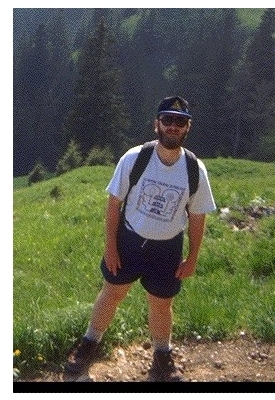Brief Biography
Dr. John A. Kershaw, Jr. (CF, RPF)
B.S. Forestry, Purdue University, 1984
M.S. Biometrics, Purdue University, 1986
Ph.D. University of Washington, 1993
Major Research Interests:
· Design of Forest Inventory Systems
· Analysis of Forest Inventory Data
· Assessment of Error in Forest Management Planning
· Design of Monitoring Systems for Forest Management Planning
· Innovative Forest Measurement SystemsÂ
· Growth and Yield Modelling
Dr. Kershaw slipped into forestry through the backdoor. He grew up in southern Indiana and spent most of his time exploring the woods around his father’s chicken farm and terrorizing the neighbors. John was active in Boy Scouts, where he earned the rank of Eagle Scout and was elected to Vigil in the Order of the Arrow. He worked at Maumee Scout Camp in southern Indiana from 1977 through 1980.  For as long as he can remember, his goal in life was to go to Purdue University, earn his veterinarian degree, move back to the family farm, live there and die and generally be happy. His first summer job during his University career took him to Colorado where he ended up being a product tester for a major outdoor equipment company. The llama packing, white-water rafting and $200/week plus expenses was an ideal career. Unfortunately, this career peaked too soon and he was never able to find another job quite as nice. Upon returning to Purdue in the fall of 1980, John switched from Pre-vet to Forestry selecting Forest Recreation as his major. In 1982, after realizing that forest recreation was not leading to a dream career of hiking in the mountains, he switched to forest management. In 1983, he was hired by Dr. Burnell Fischer of Purdue University to manage the Purdue Continuous Forestry Inventory System. This job led directly into a Master’s program at Purdue. During his final undergraduate year and for the three summers following, John worked as the summer field camp teaching assistant. Besides many hours spent fly fishing, drinking Leinenkugels, eating morels and rescuing lost forestry students, John learned that he really enjoyed teaching. Through the guidance and encouragement Dr. Fischer gave him, John decided to pursue a Ph.D. at the University of Washington, in Seattle, WA, with Dr. Chadwick Oliver and Dr. Doug Maguire. After a short stint with a cooperative Purdue University/US Forest Service oak regeneration project, John began working on his Ph.D in January 1987. After four years at UW, John accepted the position of Assistant Professor of Forest Biometrics at UNB in 1991. John currently teaches Forestry 1000: Introductory to Forestry and Forestry 5973: International Forestry Studies. He also offers Forestry 4206: Forest Biometrics in alternating years and Biol5473 Statistics for Experimenters. John’s professional interests include: 1) understanding how social, cultural, economic and historical factors influence forestry practice and decision making around the world; 2) design and analysis of inventory systems; 3) inventory as a monitoring tool; 4) integration of timber and wildlife inventories; and 5) propagation of sampling errors through inventory analysis, forest management planning and growth and yield projection. Dr. Kershaw is an avid reader, falling just short of his goal of reading 500 books in 10 years (497 from 1984 –1994). Reading interests include historical travel, natural history, philosophy, and personal essay. His favorite authors are Annie Dillard, John McPhee, Mark Twain, Charles Dickens, David Lodge and anyone else who might write an interesting book. Dr. Kershaw thanks his father, Dr. Burnell Fischer, Dr. Joseph O’Leary, Dr. Chadwick Oliver, and Dr. Doug Maguire for their devotion and time spent molding his development as a person and professional forester. All credit and all complaints should be directed to them. He is also deeply indebted to the influence Jacob Leinenkugel and Bert Grant had on his Master’s and Ph.D. studies, respectively.